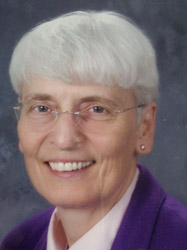Queer Heroes NW 2012
Peggy Burton
 By Charles Hinkle and George T. Nicola
By Charles Hinkle and George T. Nicola
The year was 1971. Because much of homosexual intimacy was felonious in Oregon and 47 other states, gay men and women were effectively criminals. There was not a single law or ordinance banning sexual orientation discrimination any place in the United States. Oregon’s gay movement was still in its formative stages.
Peggy Burton was a biology instructor at Cascade High School near Salem. The school was pleased with her professional performance. She was living with a female partner, but was not out at work. However, that did not stop rumors from circulating.
Peggy explains that “One day out of thin air with no warning I was called in to the principal's office and he said he had heard a rumor that I was a homosexual.” She replied, "So what. What does that have to do with teaching?" The outcome, Peggy says: “He fired me on the spot.”
Peggy was not content to allow this injustice go unchallenged. But she had a hard time finding a sympathetic lawyer. Finally, she went to the American Civil Liberties Union of Oregon where her case was taken by a young attorney named Charles “Charlie” Hinkle.
Peggy was the first LGBT public school teacher in the United States to file a federal civil rights suit, and the first LGBT person in Oregon to file a civil rights lawsuit of any kind. At the time, there were only four reported gay rights cases in the law books in the entire country.
While her case proceeded, Peggy continued to live in Salem. She lost many friends and sometimes was screamed at and spat on. After receiving a number of hate phone calls, she changed to an unlisted number.
Peggy struggled to make it through financially. She also testified before an Oregon House committee in support of the first bill attempting to ban sexual orientation discrimination in Oregon.
Eventually, the Federal District Court in Portland held that the statute the school district relied on to fire her, which allowed schools to terminate teachers for “immorality”, was unconstitutionally vague. The Court ordered the school district to pay her $10,000, but refused to order reinstatement because as a second year teacher, she did not yet have tenure. The Ninth Circuit Federal Court of Appeals affirmed the refusal to reinstate her, on a 2-1 vote.
Peggy went on to realign her career which she eventually carried to the Midwest. Today, Peggy’s firing would be illegal under our Oregon civil rights law that finally passed in 2007, 34 years after Peggy testified for the first such proposed legislation. The law should discourage antigay employment discrimination, but that doesn’t mean it doesn’t still happen. It took a lot of courage for Peggy to defend her rights at a time when few were there to support us. Today we are in a better place because of people like her.
P.O. Box 3646 • Portland, OR 97208-3646 • info@glapn.or
Copyright © 2015, Gay & Lesbian Archives of the Pacific Northwest


